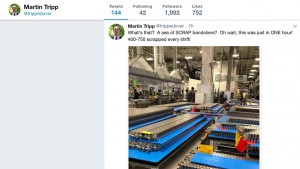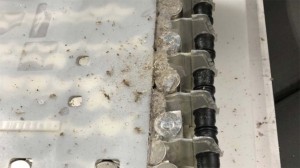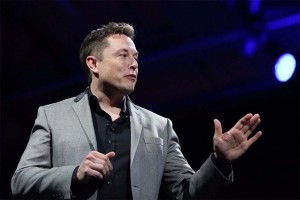Regulators, whistleblowers, analysts and investors? Oh, and did we leave out factories finally emerging from “production hell?” It’s been a busy 24 hours for Tesla and CEO Elon Musk, with a heavy mix of both good news and bad news.
Here’s a summary of key developments including claims for a quality cover-up, an SEC probe and the possibility that Tesla could wind up being more profitable this year than even its most bullish proponents had expected:
Whistleblower claims Tesla covered up battery problems, delivered defective cars to customers.
Tesla’s battle with Martin Tripp – a self-styled whistleblower whom the carmaker prefers to call a saboteur – is heating up. The former employee at the Gigafactory battery plant has tweeted out images of what he claims are defective lithium-ion battery packs that were nonetheless installed in sedans to help Tesla speed up production of the Model 3. Tripp also posted of vehicle identification numbers that he claims are equipped with the batteries which, among other things, may have punctures.
“As we’ve said before, these claims are false and Mr. Tripp does not even have personal knowledge about the safety claims that he is making,” a Tesla spokesman countered. “No punctured cells have ever been used in any Model 3 vehicles in any way, and all VINs that have been identified have safe batteries. Notably, there have been zero battery safety issues in any Model 3.”
(Musk, Tesla board move forward with privatization plan. Click Here for the story.)

Another Tripp tweet. He also sent out a list of VINs covering vehicles allegedly using bad batteries.
Tripp’s tweets are likely to heat up what is already a fiery battle with Tesla. The automaker has sued its former employee in federal court and claims he not only has stolen confidential information but hacked its production system. Tripp has counter-sued and claims the automaker is simply trying to cover up its quality problems.
Twitter, meanwhile, has entered the fray, suspending Tripp’s tweets about alleged Tesla defects.
A second whistleblower is warning about what could happen to Tripp.
Former Tesla engineer Cristina Balan offers a cautionary tale about what she claims the company does when employees raise concerns about quality. In a new interview with Business Insider, Balan says she and her entire team were not only punished for raising concerns about the quality and safety of Tesla parts but, in her case, pushed out of the company.
Balan filed a whistleblower claim against Tesla and spent years battling with it through arbitration
The company has been facing a number of lawsuits and other actions brought by allegedly wronged employees. That includes an ongoing case brought by the National Labor Relations Board which contends nearly 1,000 workers at the Tesla assembly plant in Fremont, California were fired in 2016 because they had advocated for a union. The carmaker contends they were doing sub-standard work.
A third whistleblower filed claims that Tesla hired former Uber employees who spied on competition.
Former Tesla employee Karl Hansen filed a complaint against the company, accusing Tesla security of wiretapping and hacking the computers and phones of current and former employees, including the aforementioned Tripp. Nick Gicinto, who used to head up Uber’s security and was accused of such tactics there, was hired by Tesla to do the same to competitors as well.
The complaint also alleges that theft and drug dealing were commonplace at Tesla.
SEC subpoena compounds problems following Musk’s tweet claiming “funding secured’ for going private.
The San Francisco office of the Securities and Exchange Commission has apparently issued subpoenas to Tesla CEO Elon Musk and the carmaker itself, according to several news reports. The still-unconfirmed move appears to be in response to the 47-year-old executive’s actions related to his plan to take Tesla private. On Aug. 7, Musk announced that he would make the move at a stock price of $420 a share, going on to declare “funding secured.”
The move was highly unusual – and potentially in violation of securities laws. The announcement was made in a tweet, and not in the usual government filing, and it came while Tesla stock was being traded, kicking off a major run-up in the share price that cost short-sellers millions in losses. Musk took nearly a week to offer more details in a blog post claiming the subject was broached during a July 31 meeting with representatives of a Saudi Arabian sovereign investment fund, but it also appeared to show that no actual plan or firm funding commitment had been locked down.
(Click Here for more about the rally and fall of Tesla stock.)
Since then, the Tesla board has taken steps to consider whatever plan might eventually be pulled together by Musk and two investment firms brought in to assist, including Goldman Sachs. Three independent board members have been tasked with reviewing any new plan. Along with Saudi money, Musk said he hoped “all” current Tesla investors would stay onboard, but legal and financial analysts have warned that the strategy could limit their options – and even expose current investors to significant tax burdens.
Tesla stock, meanwhile, has continued to yo-yo since the privatization announcement was first made. After initially posting sharp gains on Thursday morning, TSLA was down by nearly a full percentage point in mid-afternoon trading.
Key analyst gives Tesla a much-needed thumbs up.
Thursday’s initial jump in trading appears to have been largely driven by the positive comments sent to investors by a key analyst. “Tesla seems well on the way to achieving a steady weekly production rate of 5,000 to 6,000 units per week,” George Galliers, of Evercore ISI said, he and his team telling investors, We did not see anything to suggest that Model 3 cannot reach 6,000 units per week, and 7,000 to 8,000 with very little incremental capital expenditure.”
That’s particularly good news, suggesting that after struggling for more than a year to push through what CEO Musk had called “production hell” at the Fremont plant, Tesla is finally turning out large numbers of the Model 3 sedans that will be essentially for it to deliver the second-half profit and positive cashflow Musk has repeatedly promised.
Despite his positive visit to the Fremont plant, Galliers said he wasn’t ready to raise Evercore’s current target price of just $301 a share for TSLA, however, cautioning that he still needed to see answers to key questions, including revenues per unit, or RpU, and profit margins. That said, “Focusing on the fundamentals and setting aside talk of privatization, we are incrementally positive on Tesla following our visit.”
(Tesla Q2 losses double, but profits promised in Q3. Click Here for the story.)
Considering all the other challenges Tesla is facing, it’s clearly a positive development for the company to have at least someone influential feeling good about its future.


